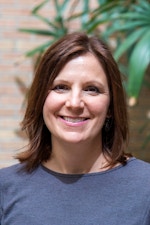Kim Fisher
- About
- Education
- Research
Biography
Kim Fisher is an Associate Professor and Director of the Special Education Assistive Technology Center in the Department of Special Education. Prior to academia, she was an inclusion specialist, learning behavior specialist, and an assistive technology consultant.
Current Courses
344.001Teaching Secondary Content to Students with Disabilities
344.002Teaching Secondary Content to Students with Disabilities
Teaching Interests & Areas
Dr. Fisher’s teaching interests include preparing general educators to teach all students, Universal Design for Learning, and research methods.
Research Interests & Areas
Dr. Fisher studies how social networks and social capital promote community participation and social inclusion for adolescents and young adults with IDD and the role access to information communication technology has in this dynamic.
Dr. Fisher uses both quantitative survey methods (e.g., egocentric network analysis, structural equation modeling, linear and logistic regression) including secondary data analysis and qualitative interviews and focus group methods (e.g., rapid qualitative analysis, grounded theory) to do this work.
Most recently, her collaborative work with public health researchers and community members has centered around the social and civic participation of youth and adults with IDD using technology. Her research team has several publications, presentations, and invited talks exploring technology access and use for social inclusion and digital citizenship of young adults with and without IDD using data from the National Longitudinal Transition Study of 2012. The team provided invited talks at the American Association on Intellectual and Developmental Disabilities and JFK Partners at the University of Colorado, Colorado Springs. Dr. Fisher has also presented her work in a national webinar series on technology access for disabled people hosted by the Administration on Community Living.
Her two current projects explore technology access and use of Illinois adults with IDD. The first project is an exploratory sequential design exploring how adults with IDD use technology for social, civic, and political participation (survey) and barriers and facilitators they experience (interviews). The second project, funded by a grant from The Arc of Illinois, explores how members of the Going Home Coalition, a group of disability advocates who work to close state institutions in Illinois, have used technology for advocacy work since the COVID pandemic using focus groups and rapid qualitative analysis.
Dr. Fisher has 15 publications, 2 technical reports, 6 invited talks, and 48 presentations.
PhD Special Education
MA Special Education
BS Leisure Studies
Book, Chapter
Puckett, K., & Fisher, K. W. (2018). Assistive Technology. In E. B. Braaten (Ed.), The SAGE Encyclopedia of Intellectual and Developmental Disorders. SAGE Publishing. https://doi.org/10.4135/9781483392271.n39
Thoma, C., Fisher, K. W., Hall, S. & Scott, L. (2017). High quality educational programs for students with intellectual disability in middle and junior high school. In M. Wehmeyer & K. A. Shogren (Eds.). Research-based Practices for Educating students with Intellectual Disability. New York, New York: Routledge/Taylor & Francis.
Journal Article
Fisher, K. W., Williamson, H. J., Guerra, N., & Kupferman, S. (2021). Digital citizenship: Technology access and use for youth with and without intellectual and/or developmental disabilities. Inclusion, 9(4), 263-175. https://doi.org/10.1352/2326-6988-9.4.263
Fisher, K. W., Williamson, H. J., & Guerra, N. (2020). Technology and social inclusion: Technology training and usage by youth with IDD in the National Longitudinal Transition Study of 2012. Inclusion, 8(1), 43-57. https://doi.org/10.1352/2326-6988-8.1.43
Hart Barnett, J. E., Fisher, K., O’Connell, N., & Franco, K. (2019). Promoting upstander behavior to address bullying in schools. Middle School Journal, 50(1), 6-11. https://doi.org/10.1080/00940771.2018.1550377
Williamson, H., Fisher, K. W., Madvhani, D., & Talarico, L. (2019). #ADA25 campaign: Using social media to promote participation, social inclusion, and civic engagement of individuals with intellectual and developmental disability. Inclusion, 7(1), 24-40. https://doi.org/10.1352/2326-6988-7.1.24
Fisher, K.W., Barnett, J. E., Zucker, S. H., O’Connell, N., & Franco, K. (2018, Summer). Teacher’s Corner: Promoting upstander behavior to address bullying in schools. DADD Express, 29(2), 1, 8. http://www.daddcec.com/uploads/2/5/2/0/2520220/dadd_18_summer_final_040918.pdf
Technical Report
McFadden. E. S., Fisher, K. W., Lee, S., & Kovacs, M., & Barajas, M. (2016). Arizona Comprehensive Review and Analysis. Report prepared for the Arizona Developmental Disabilities Planning Council. Retrieved from https://addpc.az.gov/sites/default/files/media/Comprehensive%20review%20and%20analysis_2016%202nd%20Edition_0.pdf
McFadden, E. S., Daughtery, D. B., Lee, S. E., Fisher, K. W., Hack, A. (2015). The Graduation Cliff: Improving the Post-High School Outcomes of Students with Disabilities. Report prepared for the Arizona Developmental Disabilities Planning Council. Retrieved from https://eric.ed.gov/?id=ED574407
Presentations
Fisher, K. W., Williamson, H., Kupferman, S. (2021, June). Minoritized Youth and the Digital Divide: Exploring Digital Access, Use, and Participation. Poster Symposia at the Annual Meeting of the American Association on Intellectual and Developmental Disabilities, online. https://www.aaidd.org/education/annual-conference/preliminary-program/concurrent-d-sessions
